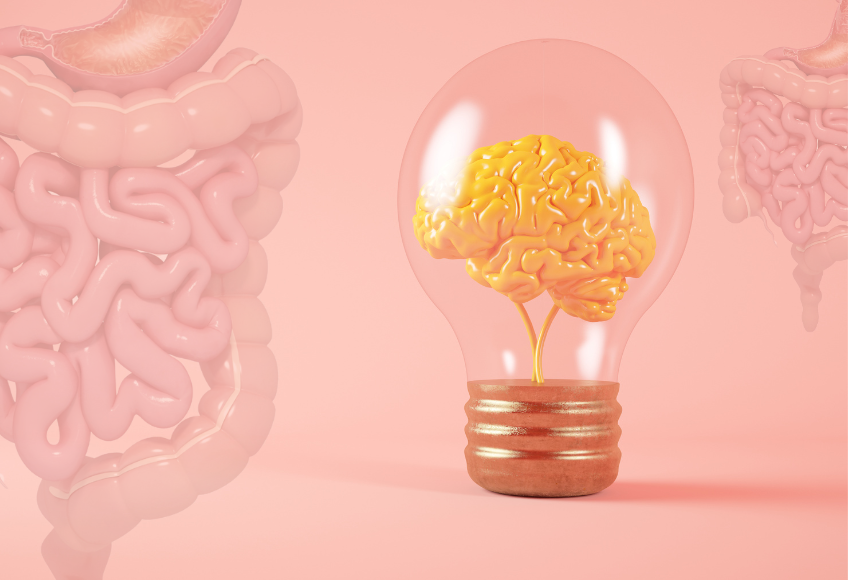
Darm-brain axis
Have you ever noticed how stress is noticeable in your stomach? Or how does your general well -being suffer when your stomach rebels? The connection between the intestine and the brain is stronger than many think.
What is the intestinal brain axis?
The intestinal brain axis is like one Communication motorway Between your stomach and your head. It consists of nerves, hormones and chemical messenger substancesthat send signals in both directions. This means that your intestine "talks" with your brain and vice versa. So your intestine has one direct influence on your emotions, your mood and even your stress level. He plays an important role in how you feel and can also Influence the risk of depression.
At the same time, your brain controls many of the processes that run in your intestine - a real one Teamwork So. But that's not all: a large part of yours Immune system also sits in the intestine. Here it is decided how your body Potential intruders Reacts. A particularly important intermediary in this communication is the Vagus nerve. The vagus nerve is the longest nerve in the human body and runs from the brain to the abdomen. His name "Vagus" comes from Latin and means "around" what is good for its numerous Branches And connections to different organs and systems fits: it is associated with almost all internal organs. It is also an essential part of the parasympathetic nervous system, which is responsible for the functions. A strong vagus nerve supports recovery after stress and promotes our circulation and our immune system. Among other things, this will Feeling of satiety and the blood sugar level regulates during food intake.
Researchers at the Max Planck Institute for Cologne for Metabolic research, of the cluster of excellence for aging research Cecad of the University of Cologne and the University Hospital Cologne, the duties of the nerve cells in the vagus nerve have examined and determined that although the Nerve cells From the same control center, they are controlled by different regions in the body and opposite functions in regulating the feeling of satiety and the Blood sugar levels take over. Some of these nerve cells react to mechanical stimuli of the organs, such as the expansion of the stomach, while other chemical signals, i.e. substances from our food, perceive. So our organs not only recognize how much we eat and when we are full, but also what we eat. If you want to learn more about the vagus nerve, you can read more here.
Why the intestine is more than a digestive body
On average, the intestine has one Total length of at least 7.6 meters. It consists in a very simplified manner from the Small intestine, followed by Colon and rectum. Our small intestine is for that Nutrient absorption responsible. Enzymes disassemble the food components such as carbohydrates, proteins and fats into their individual parts. The Small intestine wall Take these components as well as vitamins and minerals so that they can get into the blood. From the small intestine, the chubby also gets into the large intestine. There the porridge is removed and the chair is thickened. At the same time, the large intestine promotes the intestinal content in wave -shaped movements in the direction rectumwhere it is excreted at best. In the large intestine there is also the Intestinal flora. Your task is to be recording and producing vitamins.
But our intestine is a real one All -rounder And has far more tasks than just using meals! There is a small universe in it: that Microbioma. Billion of Microorganisms - The so -called intestinal bacteria - live there and do impressive work. They not only support digestion, they also influence them Mood, the immune system And even the brain. About 90 % of the Serotonins, that is, the "happiness hormone", are produced in the intestine. No wonder that a healthy intestine also contributes to a happy spirit. The Intestinal mucosa also takes over an important one Protective functionby keeping us from harmful fabrics. However, if this barrier is disturbed - a state that is "Leaky good" is known - inflammatory processes can be triggered that can affect your brain. It is worth putting some care in our intestinal mucosa. Be it with one Dysbiosis with the Suitable probiotic, spa. L-glutamine Or in phases.
Our L-glutamine complex
With only three ingredients: as few ingredients as possible, as much as necessary for the best tolerance.
- especially developed for people with histamine intolerance
- Targeted the body with L-glutamine
- histamine
- gluten -free
- fructose -free
- lactose -free
- vegan
- free of artificial additives and fillers
The connection to mental health
💡 Researchers have discovered more and more exciting relationships between the intestine and psyche in recent years. For example, studies show that people with depression often also have a disturbed intestinal flora. A healthy diet that supports the intestine can help relieve depressive symptoms. A diet could have a positive effect on the psyche with lots of fruit, vegetables, whole grains and probiotic foods. This is because these foods nourish the intestinal bacteria that are important for the production of neurotransmitters and serotonin.
Stress and the intestine
Do you know the feeling that you get together when the stomach is stressed? This is no coincidence. Stress has a direct influence on the intestinal brain axis. For example, he can:
- Influence the mobility of the intestine (keyword: diarrhea or constipation)
- Weaken the barrier function of the intestinal mucosa
- Promote inflammation that can affect your entire health.
☝🏼 Stress can also release histamine! And here the connection to histamine intolerance comes into play.
Histamine intolerance and the intestinal brain axis
For people with Histamine intolerance a functioning intestine is particularly important. The reason? The intestine is that The main town where histamine is broken down. If the Intestinal health is impaired, it can lead to one increased accumulation of histamine come in the body, which in turn the typical Symptoms of histamine intolerance reinforced. Studies show that stress Histamine production can boost. This exacerbates the symptoms and leads to a vicious circle: more stress = more histamine = more complaints.
When stressed, the body pours the hormone Cortisol from what that Nervous system activated and the Hypothalamus hypophysis axis stimulated. This makes the Fight-or-escape mode triggered that starts numerous processes. The body saves energy by not taking vital functions such as digestion, healing and detoxification. Cells no longer absorb nutrients, oxygen or minerals and do not emit mining products. The resulting Cell milieu becomes toxic and blocked growth and repair processes. Neurotransmitter Like adrenaline, noradrenaline and dopamine, are released to sharpen the senses and the Alarm state to maintain. At the same time, the immune system is activated what the Mast cells stimulates for the release of histamine. This increases the alarm state by Nerve cell receptors bind. The pulse rises, the blood vessels widen and it will be more adrenaline released. Stress leads to a circulation that causes even more stress and histamine.
The combat or flight mode, which can be life-saving in dangerous situations, becomes problematic if it remains active. This physiological stress ensures one Constant histamine release, the organ systems burdened, especially the immune system. If the "stress barrel" is overcrowded, the weakest link in the body - be it intestinal, skin, heart or psyche - and diseases such as histamine intolerance, allergies or other complaints can arise. Studies show that this condition is often triggered by unconscious memories. Memories are not only stored in the brain, but in all cells. Around 90 % of these memories are unconscious and can automatically activate the nervous system in certain situations. At this moment, the reactive mind takes control and switches off logical thinking without deliberately controlling. The condition of your intestine is reflected over the Darm-brain axis So again in your mental health. So it is no wonder that, conversely, our diet can have an impact on our mood-because the intestinal brain axis is not a one-way street! Just as the brain affects the intestine, the intestine also affects our brain.
Tips for a healthy intestine and a relaxed brain
💛 Fit in the intestinal -friendly! Avoid heavily processed foods that can bring your intestinal flora out of balance.
💛 Relaxation methods such as yoga, meditation or breathing exercises can help to activate the vagus nerve and reduce stress.
💛 Regular exercise is not only good for your body, but also for your psyche.
💛 Watch which foods do well and which not.
💛 Omega-3 fatty acids, zinc and vitamin D can help to strengthen your intestinal mucosa.
💛 Take medication like antibiotics only if they are really necessary and not 'for good luck'.
💛 Find a doctor or therapist who is familiar with histamine intolerance.
Collapsible content
SOURCES

From those affected for those affected
We are Thomas and Michaela Zinser, founder of Histaminikus.
Because of the own histamine intolerance of Michaela and our son, we founded Histaminikus. The frustration does not find any suitable histamine food has spurred us to develop low -histamine food.
We would like to give you back a piece of quality of life. Feel free to look around with us.
Kind regards
Thomas and Michaela







